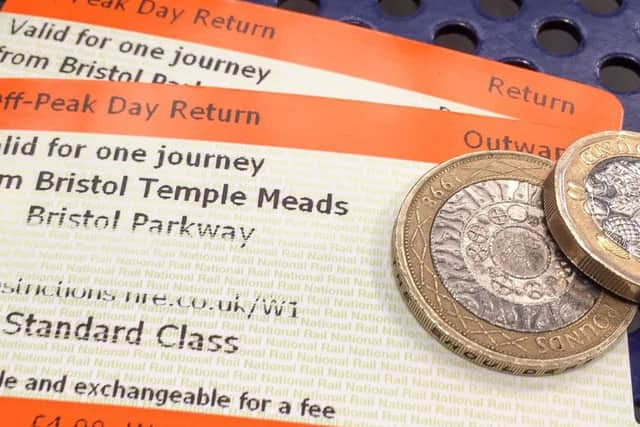Campaigners protest in Edinburgh against increase in rail fares
Members of the Rail, Maritime and Transport union (RMT) will stage demonstrations on Wednesday outside stations in cities including London, Birmingham, Cardiff, Leeds and Edinburgh.
The union claims passengers are paying “through the nose” for overcrowded services.
Advertisement
Hide AdAdvertisement
Hide AdResearch published this week found that the cost of rail travel has increased at more than twice the speed of wages since 2008. The TUC said fares have risen by 42 per cent over the past 10 years, while nominal weekly earnings have only grown by 18 per cent.


Many long-distance commuters will see the annual cost of getting to work increase by more than £150 next year.
The Department for Transport (DfT) uses the July Retail Prices Index (RPI) measure of inflation to determine the cap on the annual increase in regulated train fares, which comes into force every January.
Economists predict this will be around 3.5 per cent, but the exact figure will be released by the Office for National Statistics at 9.30am on Wednesday.
Regulated fares include season tickets on most commuter routes, some off-peak return tickets on long-distance journeys and Anytime tickets around major cities.
The Scottish Government caps regulated off-peak fare increases at RPI minus one percentage point.
Campaigners argue it is unfair on passengers to use the RPI figure instead of the lower CPI measure of inflation.
RMT general secretary Mick Cash said: “Even if fares were pegged at the more modest CPI, these latest increases would still massively outstrip wages leaving the British passenger to pay through the nose to travel on rammed out and unreliable services.
Advertisement
Hide AdAdvertisement
Hide Ad“Meanwhile the rail companies, the majority of whom are foreign state owned, are using the British transport system as a cash cow to hold down their own domestic fares.”
Transport Secretary Chris Grayling sparked anger on Tuesday after telling rail unions he wants to move the industry away from basing increases on RPI inflation, including pay rises.
Union leaders accused him of trying to cap pay rises in the industry. Labour said it was a “pathetic attempt” to shift the blame for Tory fares policies.
TUC analysis earlier this year showed that UK commuters spend up to six times more of their salary on rail fares than other European passengers.
The union organisation said that despite months of cancellations and delays, private train companies paid out at least £165 million in dividends to their shareholders, while the taxpayer handed £3.5 billion to these companies last year.
TUC general secretary Frances O’Grady said: “Our railways need urgent investment, but private rail companies are being allowed to prioritise shareholder profits over improving services.
“It’s time for Britain’s railways to be publicly owned. This would free up money for much-needed upgrades and lower ticket prices.”
A DfT spokesman said: “Any fare increase is unwelcome, but it is not fair to ask people who do not use trains to pay more for those who do.
Advertisement
Hide AdAdvertisement
Hide Ad“Taxpayers already subsidise the network by more than £4 billion a year - meaning that 38 per cent of our transport budget is spent on the 2 per cent of journeys that the railway accounts for.”
The Rail Delivery Group, representing train companies, said 98p of every pound spent on fares is “invested back into the railway”.
Rail regulator the Office of Rail and Road said regulated fares went up by an average of 3.3 per cent in January 2018, following the July 2017 RPI figure of 3.6 per cent.
